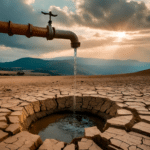Connection Between Well Water and Groundwater
The relationship between healthy water and groundwater is both direct and vital. Groundwater, which exists in the saturated zone of soil and rock layers under the Earth’s surface, is the primary source of well water. Understanding this connection is crucial and empowering for managing superior performance, especially during drought conditions.

Wells serve as artificial access points to groundwater. When drilled, a well taps into an aquifer, a layer of permeable sand, rock, or gravel that stores groundwater. This direct access allows water to be pumped to the surface for various uses, such as drinking, irrigation, and industrial processes. The performance of a well is closely tied to the water table, which is the upper surface of the groundwater in the aquifer.
The water table plays a critical role in determining the availability of well water. It fluctuates based on natural factors like precipitation and human activities like water extraction. When the water table is high, wells can quickly draw sufficient water. However, during periods of low rainfall or high groundwater usage, the water table can drop, making it harder for wells to access water. A significant drop in the water table can lead to wells running dry, mainly if they are not deep enough.
Impact of Drought on Groundwater Levels and Wells
How does drought affect groundwater levels and my well’s performance? Droughts and prolonged periods of abnormally low rainfall pose significant challenges for surface and groundwater resources. These dry spells can have far-reaching implications for the environment and individuals who rely on wells for their water supply. Understanding the impact of droughts on groundwater levels and well performance is critical to effectively managing water resources during these periods. Drought significantly impacts groundwater levels and the performance of wells in various ways:
- Decreased Recharge:During a drought, less precipitation reduces groundwater’s natural recharge. This means aquifers receive less water to replenish the water extracted by wells.
- Increased Pumping:Drought conditions often lead to increased reliance on groundwater for agricultural, industrial, and domestic use, which can lead to more intensive pumping. This heightened extraction exacerbates the decline in groundwater levels.
- Water Table Decline:Prolonged droughts cause a significant drop in the water table, the upper level of an aquifer. As the water table falls, wells must be more profound to reach the water, which can make existing wells insufficient if they are not deep enough.
- Well Performance:Lower groundwater levels can cause wells to run dry or reduce their yield. A well that once produced adequate water may no longer be able to do so if the water table drops below the well’s intake level.
- Pump Issues:As groundwater levels decline, pumps may work harder to lift water from greater depths. Pump issues may lead to wear and tear on equipment, higher energy costs, and potentially more frequent maintenance or replacement.
- Water Quality:Drought conditions can also affect water quality, leading to higher concentrations of contaminants, such as salts and minerals, drawn from deeper in the aquifer.
According to the USGS, droughts can significantly lower groundwater levels, affecting the availability and reliability of groundwater as a resource. For instance, severe droughts have led to numerous wells running dry in California’s Central Valley, a region known for extensive groundwater use. This has resulted in communities facing water shortages and farmers struggling to irrigate their crops.
Never Run Dry Again!
At Well Manager, LLC, we understand the challenges and frustrations of low-yield wells, especially during droughts. The direct relationship between well water and groundwater means that fluctuations in the water table can significantly impact your water supply. Whether it’s reduced water flow, increased pumping costs, or declining water quality, the effects on your well’s performance can be severe, urgent, and disruptive.
Our mission at Well Manager, LLC is to help you navigate these challenges and ensure you always have consistent water pressure and supply. We specialize in solutions that manage and maximize the efficiency of low-yield wells, providing you with the reassurance and confidence necessary to keep your well functioning optimally.






